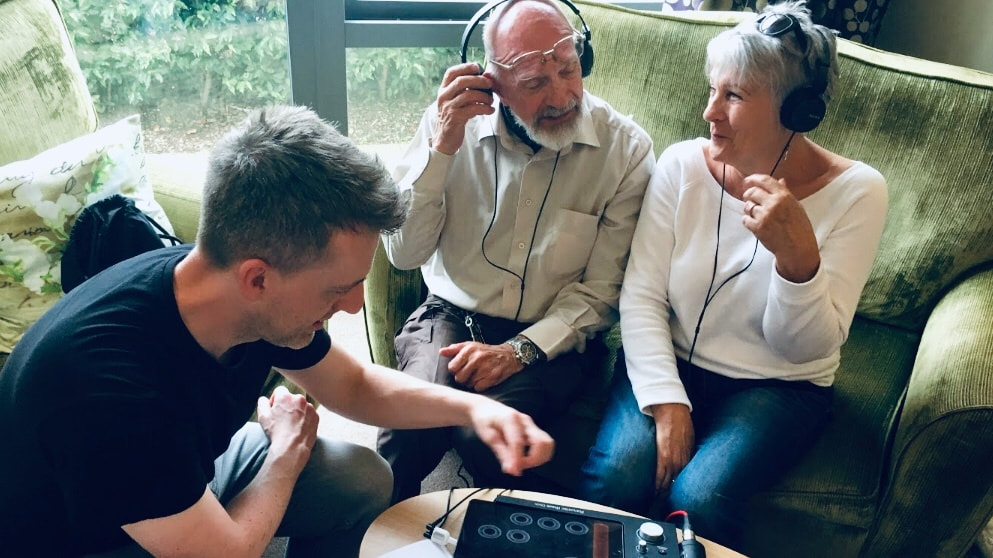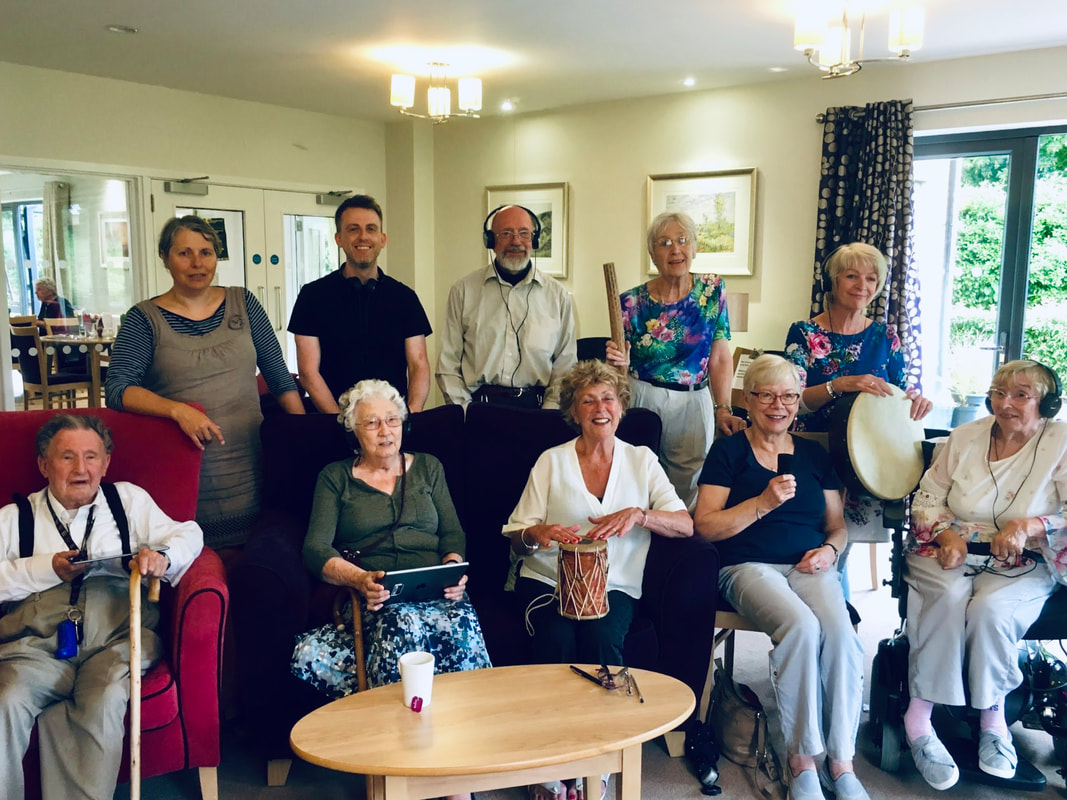|
Delivering the Sounds Like Sherbet Lemons music project has been an unusual experience - with lots of reminiscing, some iPads and the occasional Pear drop sweet thrown in. OK - so it’s not a standard recipe for running music workshops in a residential home, but at Montgomery Court in Strood, Rochester, something rather special happened. We’d like to share some of our learning as joint music facilitators on the project...
So what was Sounds Like Sherbet Lemons? It was a music project - but forget tambourines and sing-alongs... and prioritised work with people aged 65+. Sounds Like Sherbet Lemons aimed to introduce people to music-making using iPad and app technology. Think along the lines of Apple Garageband, Loopy HD, visual scores compositions. A highlight included creating ringtones and radio jingles, based on key words and sounds affiliated with personal memories, and stories from bygone eras. SparkedEcho's Kevin Grist co-delivered the project with Tania Holland Williams of Fat Lady Opera CIC. The project was funded by The Pargiter Trust. Why was it special? It was special because participants came from both within the residential home and outside to take part. From our observations, this helped animate the residential home space, generating laughter-filled conversation and memory exchange, whilst fostering new friendships. Outside participants were encouraging those from the residential home to take up external activities with them. From our observations, many shared some of their personal histories - the joyful, hilarious and sad moments - and became more adventurous with trying our new technology and creativity. Participant feedback confirmed this... "I definitely enjoyed it. I particularly enjoyed using the live looping software which Kevin demonstrated in week 2... that was the highlight for me. By week 6, I was using it at home on my iPad!" "I made new friends, it's good and you could have a laugh in the workshops" The difference the music-making has made across a number of social skills and mental health indicators include: - Making new friendships that have animated the residential home space - Learning music composition skills in a way that has supported people to take more risk in their music-making - An unexpected engagement with music technology and excitement about what it can open up - The opportunity to reminisce in a supported and caring environment has knitted the group together - Seeing and taking part in the process of generating a small idea and growing it into a beautiful piece of music has given participants a sense of their own creative talents. - Making ringtones and gifting them to others in their lives has reminded participants (and their families/residential home staff) of their voice in society, and brought the reward of being a contributor to those around them. Did we have challenges working in a residential setting? We were given access to the shared living room area of the home to deliver the workshops - which was beneficial as it was a large room and had lots of natural light. Although, we couldn't help but feel at times that we were invading the private space of residents when we pitched up with our instruments and audio kit! It was also tricky moving around heavy armchairs and sofas during set up and set down. To run this project again, I think we would ask that staff are present at the start of each workshop to welcome us in and introduce us to residents who may not have seen us before. We will also be mindful of looking at homes that have a dedicated activity or workshop area available. Did we have enough facilitators? Sounds Like Sherbet Lemons had just two facilitators. The participants had a wide variety of illnesses and conditions from near blindness and dementia, to an advanced motor neurone condition. We had to be mindful of an individual's mental wellbeing, moods and group dynamics. We feel the sessions would have been more effective and accessible with the help of additional support volunteers, working with those participants on a one-to-one basis. Unfortunately, this was not feasible within the residential home environment in which we were working. However, there were other more able participants who supported their peers in a collaborative, generous way. Next time, we will cost in additional support workers, seek more support from the residential homes and recruit ‘younger older’ peer support volunteers. How did we plan for irregular attendees? The nature of running the project on Mondays meant we worked around 3 Bank Holidays, which stretched the project over a 13 week timescale, instead of 10 consecutive weeks. For some participants, this was a long commitment where around half the group regularly attended, while others were more transient. This made it challenging, not only to plan a scheme of work, but also to establish a sense of group identity and momentum. We approached this by emailing participants during the holidays and focusing on smaller 3-4 week creative activities, e.g. creating a ringtone, or drawing and playing visual scores. In would be worth incorporating activities that can be finished within one session, in a future project. How did we challenged potentially offensive language and attitudes? This is something that most arts facilitators have to manage at some point in their practice. During this project, we observed the use of discriminatory language, where we felt we had to adopt the approach of a firm, but friendly reminder for mutual respect between participants. This supported the group as a whole to remain friendly and open to each other (and us). While we don’t think it’s our role to judge personal viewpoints, it is our role to ensure all participants feel safe. Was the right technology available? For this project we used 5 iPads, between a group of 14, on average. We managed by working in small teams as much as possible, but it was challenging during individual music-making. The WiFi connection was weak in our room, which also created problems uploading work to iCloud and streaming video/audio content. In future we would ensure a good connection to the Internet, more iPads and consider more backup activities if the WiFi goes down. Going forward, we have an ambition that every older person we work with will have access to their own tablet device. Take a listen to some ringtones created by the participants, using microphones, vocals and Apple GarageBand... What happened to the participants? - Three participants have indicated that they are now pursuing, purchasing and engaging with musical app technology in ways that they had previously not thought possible. - One participant indicated that she had not been very interested in music tech and had dismissed it in her mind, but is now surprised by how excited she is about the possibilities it gives her to create music. - One participant has written a rap and this has led to her informally recording it with her granddaughter. - There are strong friendships that have been growing across the participant group. One such friendship has unexpectedly led to a residential home tenant joining the RiverVoice Choir. - Several participants have indicated that they are distressed about the end of the project and that we are not going to be meeting together on Mondays to explore our music and our memories. This is particularly true of the Montgomery Court residents. What’s next for the project? We aim to create a Sounds Like Sherbet Lemons package of sound/tech-based activities that we can deliver to a wider pool of older people in local care/residential home settings. We are currently creating a crowdfunding campaign and will be making the case for an outreach kit of 12 individual iPad stations (including tablets, headphones, microphones and mini keyboards) to reach more isolated groups. We will also be talking to music manufacturers to see if any money raised can be matched. If you are interested in supporting our crowdfunding campaign, please get in touch - we'd love to hear from you. By Tania Holland Williams - Director - Fat Lady Opera + Kevin Grist - Director - SparkedEchoComments are closed.
|
|
Electric Medway
Community Interest Company No. 10405258. © 2015-2024 Electric Medway CIC. All rights reserved. Newsletter sign up Success! You are now subscribed to our newsletter. |
Studio 7, Sun Pier House, Medway St,
Chatham, Kent, UK. ME4 4HF. Member of
Medway Voluntary Action. Outdoor Arts UK. Outlands National Experimental Music Network. The Old High Street Intra Cultural Consortium (Heritage Action Zone). Awards 2023 Winner Outstanding Support from an SME to Hi3 Network Project - Hi3 Network. 2023 Finalist Community and Outreach Partner of the Year - Canterbury Christ Church University. 2022 Shortlist Best Arts Project - Hearts for the Arts Awards. |




